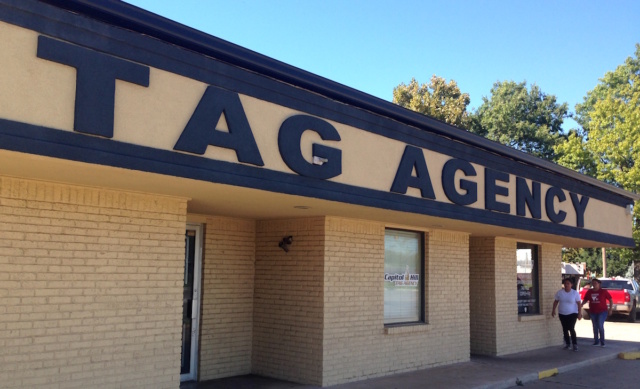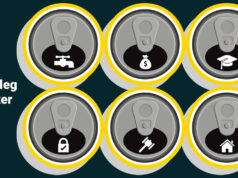(Editor’s note: On Monday, Oct. 3, NonDoc posted an updated version of this story here. That post attempts to get to the bottom of the reported 90-day grace period/extension for military base enforcement.)
Twelve days.
The State of Oklahoma has applied for an additional exemption to the federal REAL ID Act that must be approved in 12 days — by Oct. 10 — or else Oklahoma drivers’ licenses won’t be accepted as identification to access many federal facilities.
“The governor is disappointed the issue was not resolved by legislators this year,” said Michael McNutt, communications director for Gov. Mary Fallin. “Secretary of Safety and Security Michael Thompson is seeking an extension as the governor’s office is committed to working with state and federal lawmakers and the U.S. Department of Homeland Security to ensure Oklahomans are not adversely affected by these changing identification regulations.”
Just a few days ago, the Oct. 10 deadline could have had even worse consequences, but the U.S. Department of Homeland Security approved a 90-day additional exemption for Oklahoma licenses to be accepted at military bases.
“In a nutshell, Oklahoma has tried to get legislation passed to address this the last two sessions, and it has failed,” said Jeff Hankins, director of drivers license services for the Oklahoma Department of Public Safety. “We’re operating on an extension right now until Oct. 10. Once that extension expires, right now Oklahomans would not be able to gain access to a federal facility (…) using an Oklahoma driver’s license or ID for identification.”
Hankins’ comments came about 24 hours before the U.S. Department of Homeland Security announced a 90-day extension for accessing military installations in Oklahoma.
Regarding other federal facilities, Hankins said Oklahomans would need to use military ID or passport “or some other document issued by the federal government.”
Aaron Rodriquez, U.S. Department of Homeland Security spokesman, explained to NonDoc that other deadlines exist as well:
Beginning Jan. 22, 2018, TSA will only accept driver’s licenses and ID cards issued by states that are compliant with the REAL ID Act or have received an extension [the actual card or document doesn’t necessarily have to be REAL ID compliant but as long as its issued by a state in compliance]. Beginning October 1, 2020, TSA will only accept driver’s licenses and ID cards that are marked compliant [the physical card or document must be REAL ID compliant].
‘Misinformation’ preventing legislative action
The REAL ID Act passed Congress in 2005, only four years after 9/11, so the required adoption of tighter standards for production and distribution of state identification cards has not exactly snuck up on Oklahoma.
In fact, the state passed a 2007 law functionally prohibiting compliance with the federal regulations. In recent years, lawmakers have proposed legislation to end that prohibition, but it has not passed.
Hankins blamed misinformation for legislators’ wariness at fixing the problem.
“The problem that has happened is misinformation,” he said. “This past session there was a group that was sending out information to the legislators that was totally inaccurate. There was a lot of information put out that we are going to have to put all our driver’s license information into a federal database, and that’s totally not true.
“I know two years ago there was information put out there that we were giving information to European countries from our database, and again, unfortunately, people are believing it and buying into it.”
‘Minimum standards’ opposed by some
Oklahoma is not the only state operating under an extension for REAL ID compliance. Rodriquez noted that only 24 states and territories have met the standards, while 28 are operating under an exemption. Four are in noncompliance, including Minnesota, Missouri, Washington and American Samoa.
“The REAL ID Act established minimum security standards for license issuance and production and prohibits Federal agencies from accepting for certain purposes driver’s licenses and identification cards from states not meeting the Act’s minimum standards,” Rodriquez said.
In Oklahoma, former legislators like Charles Key (R-OKC) and Randy Brogdon (R-Owasso) have opposed adoption of REAL ID standards. Arguments against REAL ID largely center around nebulous fears of databasing and biometric information collection, neither of which the act explicitly requires.
The Tulsa World’s Randy Krehbiel has documented the topic in great detail.
But across the country, opponents of REAL ID include right-leaning organizations like the Cato Institute as well as ACLU chapters in Washington, Vermont and Oklahoma.
From a December commentary on NonDoc from author Kevin Eaton:
Besides the financial costs, opponents of the REAL ID Act cite privacy and potential civil-liberty infringement as their chief concerns. Brady Henderson, legal director of the Oklahoma chapter of the American Civil Liberties Union, said his group opposes REAL ID because of the potential for privacy infringement.
Henderson said a larger privacy debate surrounds REAL ID concerning how much private information a person willingly gives up versus how much the government takes.
Still, Hankins of OKDPS points to the original purpose of REAL ID.
“The whole premise of REAL ID is to make a driver’s license more secure,” Hankins said. “You know, the 9/11 commission is the one who came out with these recommendations.”






















